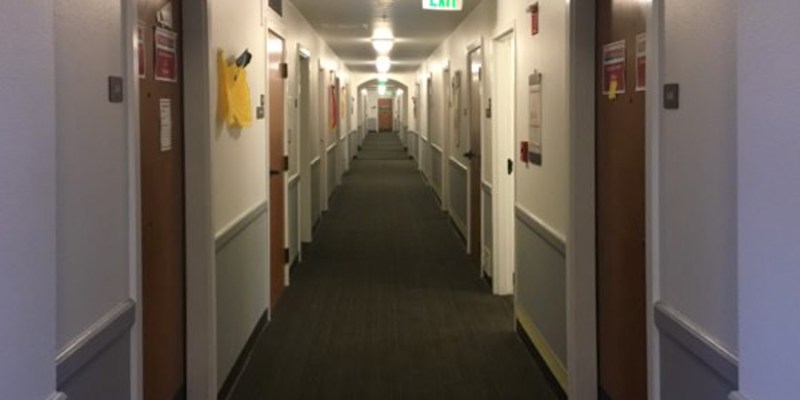Some RAs who spoke on condition of anonymity out of fear of professional retaliation from the University have been given first-name pseudonyms to improve readability.
After 43 students tested positive for COVID-19 in the first few days of winter move-in and the University abandoned its plan to invite frosh and sophomores back to campus, residential assistants (RAs) have expressed continued frustration with the administration for what they believe to be inadequate communication and insufficient directions for maintaining campus safety.
Though frosh and sophomores are no longer invited back to campus, RAs who choose to remain may continue their roles in a limited capacity by staffing for students who have been approved to live there due to special circumstances. But some RAs who have decided to stay are concerned that a lack of clear communication from the University during their initial training foreshadows continued difficulty keeping students safe for the remainder of the quarter.
Even before coming to campus, RAs said that they felt unprepared to properly oversee move-in due to a lack of prior training. Jianna So ’22, an RA in Norcliffe and chief of staff for the Associated Students of Stanford University (ASSU), said that the RAs’ training was “really different than the usual comprehensive two weeks.”
University spokesperson E.J. Miranda wrote in a statement to The Daily that the residential staff’s training focused on “student health and safety,” particularly with respect to RAs’ role “in helping students understand and adhere to the Campus Compact.” Unlike in previous years, the training was delivered through Canvas, with lessons taught asynchronously, followed by “daily Zoom meetings with professional staff.” Miranda also said that student staff training will continue throughout the winter quarter.
But some RAs said that during their training, many of their questions went unanswered, leading to confusion regarding what rules were in place and how they should be enforced.
Mark ’21 said that “nobody could give us an answer” when RAs asked about bathroom safety protocols during staff training. “They are either completely ignorant of the issues on the ground or else are hoping we just figure it out ourselves,” he said.
Miranda wrote that student staff were, and still are, able to submit questions to the administration via an online portal. In addition to a Residential Education (ResEd) FAQ document, the University created another document last week to “clarify county travel quarantine and Stanford restricted activity period expectations.”
Some RAs said that they were still largely left to determine many things on their own, and dorms began developing differing rules and enforcement procedures that created more confusion for students and staff. questions.
“Requirements to comply with COVID rules should be a standardized thing across campus,” Sarah ’21, another RA said. “It should not be a dorm by dorm thing because that would just create a lot of resentment in the student body.”
Sarah added that most RAs do not have experience creating and imposing public health guidelines, so the “punting of responsibility” from the administration onto RAs was irresponsible and could lead to improper policies.
Acknowledging the ever-changing public health situation of Santa Clara County, RAs said that they were often confused by the constant evolution of the University’s COVID-19 safety guidelines, which are often updated to company with Santa Clara County’s procedures.
“I think [the confusion] stems from how dire the situation is getting, with Santa Clara County’s own stay at home orders being updated and how that affects changes in Stanford’s own policy,” So said.
“And in order to reflect those changes, what has been the most confusing is where to look for the most updated information.”
She added that because of the unclear guidance, some RAs and Residential Fellows (RFs) decided to make infographics for residents based on their own understanding of campus policies.
But the adaptation of Santa Clara County’s policies has also created logistical issues. RAs raised concerns that policies meant for residential neighborhoods may not work as well for college dorms, citing key differences such as communal bathrooms and taking out the trash — activities about which both Sarah and Mark have asked the administration without receiving clear answers. Sarah said that “the rules don’t seem to take into account what living on campus actually is.”
Mark added that “[the administration] really has no clue what residential living is actually like and that’s why so many questions have been left unanswered.” He said that because the University is being unclear about their specific policies, they are “endangering” residents, student staff and kitchen and custodial staff, as well as the greater Bay Area community.
“They couldn’t acknowledge those questions because it would easily poke holes into the whole plan of bringing us back at all, which they did anyway as soon as people stepped foot on campus,” he said.
While the University has seen a sharp spike in cases during the first week of students moving back to campus, Miranda wrote that they are “mostly associated with students arriving on campus or returning to campus following the winter break, as opposed to virus spread within our community on campus.”
“Working with the members of our university community, we are confident that we will be able to provide a safe and supportive environment on campus as we continue to navigate the challenges of the ongoing pandemic,” he added.
Contact Hannah Basali at hbasali ‘at’ stanford.edu and Jessica Zhu at jesszhu ‘at’ stanford.edu.
